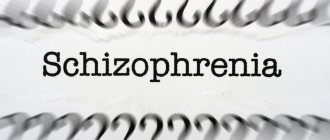At the initial stage of development it is very difficult to establish the correct diagnosis, so it progresses quickly. And this is truly scary.
Here is a far from complete list of questions that concern parents who have noticed something strange in their child’s behavior:
- What is the cause of the development of mental disorders in children?
- What you need to know about the first signs of teenage schizophrenia?
- How to recognize a mental disorder in a child’s changeable behavior?
- How to properly diagnose and treat this disease?
- Is it possible to get rid of schizophrenia forever?
- Is there a possibility that mental disorders will go away along with adolescence?
There are answers to these questions.
Causes
The exact cause of the development of schizophrenia in adolescence is not known for certain. However, we can confidently say that there are factors that have a direct impact on the formation of the disease. These include:
- hereditary predisposition;
- stressful situations;
- complex family relationships;
- computer addiction;
- drug use;
- smoking, childhood alcoholism.
Through many years of research, it has been proven that a teenage child is twice as likely to develop schizophrenia if this disease was previously detected in one of his relatives. The likelihood of a mental disorder increases significantly if both parents suffer from schizophrenia. Heredity has a huge influence on the formation of personality traits.
Stress is known to be the cause of many diseases, and schizophrenia is no exception. Excessive experiences, combined with the unformed psyche of a teenager, form the basis of first emotional disruptions and then severe psychoses. And they already entail schizophrenic disorders.
A turbulent situation in the family, conflicts with parents, youthful maximalism - all these are attributes of adolescence. They may well become the impetus for the development of the disease. A teenager who does not find support and understanding for a long time loses self-esteem, withdraws into himself and becomes depressed. You cannot do without the help of a psychotherapist in such a situation.
Excessive passion for computer games is the scourge of our time. What does schizophrenia have to do with it? It's simple. During the game, the perception of real events occurs. The more a teenager is attracted to the computer, the thinner the line between the real and virtual world. The understanding of all life events changes dramatically. Hallucinations and delusions are perceived as part of the game, and the child has no desire to leave it. Parents do not see anything unusual in the fact that he is talking to himself, but it is at this moment that they need to start sounding the alarm.
Drugs, alcohol and cigarettes in themselves are unacceptable things for a teenager. They have a negative impact on the physical condition of a still fragile child’s body, leading to general intoxication and mental retardation. But the worst thing is that the brain cells suffer from this. An incompletely formed psyche under the influence of narcotic substances can provoke a malfunction leading to schizophrenia and other severe disorders of consciousness.
Old hardware - new software
There are many mysteries in the history of our species. One of them is the dramatic acceleration of scientific and technological progress in the last 2000 years. Major inventions of antiquity (the boat, the bow and arrow, sewing needles) were accomplished at a rate of about once every 10,000 years. And then - as if someone had turned on the afterburners - humanity in a short time covered the path from the wheel to Tesla and Hubble. At the same time, the structure of the human brain has remained virtually unchanged over the past 50,000 years. Jaynes's theory provides a possible solution.
The reason is not the hardware evolution, but the software revolution. We didn't change the hardware. Taking advantage of the plasticity of the brain, we simply downloaded new software onto it, which turned out to be more effective. To do this, it was necessary to add one option to our consciousness - the ability to separate: fantasies from reality, thoughts from facts, our “I” from other “I”, the inner voice from the order from the outside. How technically did this happen? Jaynes suggests that the main stimulus was the creation of writing. By being able to record the voice in one's head, one was able for the first time to think about its orders instead of blindly following them. And he realized that this voice belonged to himself. The split consciousness became united. But not immediately and not completely.
“We are in the process of transitioning to a new mentality. Everywhere we are still surrounded by remnants of our “bicameral” past: our presidents swear an oath to long-silent gods, placing their hands on texts written down by the last people who heard divine voices.” Julian Jaynes
After the release of a new system, there are always those who want to stick with the old, time-tested software. Until now, people are trying to simulate duality of the psyche with the help of religious rituals and practices. Even people who are far from religion, in a situation of uncertainty, are tempted to entrust the decision to “external forces” - cast lots, tell fortunes, act on a whim.
Manifestations of the disease
Unfortunately, there are no symptoms that can be detected to clearly indicate that a teenager is developing schizophrenia. Each case is individual. It would seem that similar manifestations in one child may indicate a serious illness, while in another it is just character traits, gaps in upbringing, or simply a bad mood.
The main signs of schizophrenia are of three types:
- Negative. They represent disorders of the psyche and some body functions. Certain emotions simply become inaccessible to a teenager. He loses the ability to think logically, plan his actions, and take responsibility for his own actions. From the outside, this may look like aloofness, isolation, or simple laziness. These symptoms are quite difficult to identify and correctly qualify.
- Positive. In fact, there is nothing good, much less positive, about them. Symptoms have this definition because they are acquired by the body as the disease progresses. These include hallucinations and delusions.
- Cognitive. They manifest themselves as a failure of mental functions, apathy and indifference. Concentration and the ability to remember and use information suffer. These violations are difficult not to notice during close contact with the child.
At the initial stage, the teenager perceives hallucinations simply as his overdeveloped fantasy. Moreover, they can be visual or auditory, or combined with each other. Only over time does the child realize that something is wrong with him. The situation is complicated by the fact that the psyche is not yet fully formed, so it is impossible to predict the consequences of schizophrenic attacks.
During the period of exacerbation, the teenager loses his sense of reality. He is confused and depressed, there is no sense of social balance. The mood can change sharply and unpredictably, emotions do not always correspond to the situation. Progressive schizophrenia does not allow active communication with others - there is autism, unsociability and apathy.
By withdrawing into himself, the child is left alone with the problem. Typical situation of the initial stage of schizophrenia:
- a teenager hears some voices in his head;
- sometimes it seems to him that they are reading his own thoughts out loud;
- he is visited by various visions;
- there is a feeling of being watched or followed.
But the worst thing is that the child cannot tell anyone about this: the parents are too busy with work or themselves, friends will most likely perceive such a story as another reason for ridicule and bullying. Therefore, there is nothing left to do but fight your own fears alone.
And only when the symptoms of schizophrenia get out of control does it become impossible to hide the disease. If this happens, you should immediately contact a specialist. Undiagnosed mental disorders in adolescence can have very dire consequences.
It is worth noting that in most cases, schizophrenia in adolescents distorts emotional perception or develops dysfunction of thinking and perception of information. But, at the same time, surprisingly, the disease does not affect intellectual abilities. That is, visible changes occur in the child’s behavior, but if he studied well at school, he continues to do so.
Bicameral Mind
Just 3,000 years ago (yes, this is not a typo - back in the days of Ancient Egypt), the speech centers in the brain were distributed differently, says American psychologist Julian Jaynes. The right hemisphere could serve as the generator of internal speech, and the left hemisphere as the receiver. He calls this model of the psyche “bicameral” by analogy with parliament, where one chamber develops laws and the other approves them. Ancient man literally listened with one hemisphere to the other, as if a real interlocutor was addressing him. Unlike us, he did not understand that the voice in his head was his own. He was sure that spirits, gods or dead ancestors were addressing him this way, and he blindly followed their instructions. All this might seem completely crazy if not for two facts.
Firstly, in modern people, the inner voice can also turn into an external one, if for some reason the ability to separate fantasies from real sensations, and thoughts from facts is turned off. Such conditions are described in detail in psychiatry as schizophrenia and paranoia. Second, we all experience a similar “double consciousness” every night in our sleep, as if taking a time machine back to our evolutionary past. Everything we dream is created by our brain. In a dream, each of us is not only a spectator and the main character, but also the author of the script, the director, the scene and the characters. It is we who give them the ability to speak, threaten, stand on their heads or ask for forgiveness. We share our consciousness with them. At the same time, the creations of our mind behave completely independently, often hostile, always unpredictable, and sometimes seem so alive that some people perceive dreams in which the dead appear as real contact.
Determining the diagnosis
Analyzing visible and hidden symptoms and making an accurate conclusion is already a big step towards getting rid of the disease. An incorrect diagnosis leads to incorrect treatment. As a result, instead of recovery, the disease drags on and progresses, and it becomes much more difficult to cope with it.
Some people generally refuse to recognize schizophrenia in adolescents as a disease. They associate unusual behavior with:
- lack of vitamins and microelements in the body;
- metabolic disorders;
- general fatigue;
- characteristics of the personality's psychotype;
- influence of external factors.
However, schizophrenia exists, and it begins in adolescence. The slightest deviation in a child’s behavior should be a reason to contact a psychiatrist.
To identify the diagnosis, the child is monitored for at least six months. There is no way to do this before, since the symptoms and course of the disease may change.
To exclude tumors and other brain diseases, it is necessary to conduct the following studies:
- Magnetic resonance imaging;
- electroencephalography;
- general and biochemical blood test;
- state of immune status;
- assessment of hormonal levels.
Specially designed psychological tests play a major role in diagnosing schizophrenia in adolescent children. With their help, you can determine which brain structure is most affected by the disease. Information provided by parents and other relatives who have close contact with the patient is also taken into account.
Treatment
There are cases when, suspecting something was wrong in the actions of a teenager, parents or teachers took him to a psychologist. The responsibilities of this specialist include monitoring the patient’s behavior, identifying his psychotype, etc. However, he will not be able to determine schizophrenic disorder. Only a psychiatrist will do this; he will also prescribe treatment.
So is it possible for a teenager to completely get rid of schizophrenia? Yes, this is possible, but not a single psychotherapist can guarantee that this will happen in any particular case. With the right treatment, long periods of remission may occur after the condition worsens.
Acute symptoms of schizophrenia are relieved with antipsychotics. This happens in a hospital, under the constant supervision of specialists. To achieve visible results, you need to take the medications prescribed by your doctor for at least three weeks. The following may be prescribed as auxiliary means:
- antidepressants;
- tranquilizers;
- antipsychotic substances.
The length of hospitalization depends on the severity of symptoms and the general condition of the adolescent. Therapy gives lasting positive dynamics. After completing an intensive course of treatment, the patient is sent home for further rehabilitation on an outpatient basis and social adaptation.
Life after confirmation of illness
Yes, it exists.
It often happens that a timely diagnosis allows you to stop the progression of the disease. In this case, the teenager may not remember his illness for the rest of his life. But not everyone is so lucky. It happens that teenage schizophrenia does not go away without a trace, but simply transforms into another stage, then you need to learn to live with it. Of course, it won’t be easy to do this, but you shouldn’t despair and give up: people live with much more serious problems. Even if the diagnosis of schizophrenia is finally confirmed, this is not a reason to despair and give up. It is very important to start treatment, and modern medications truly work wonders and have virtually no side effects.
Nowadays, schizophrenia is not a death sentence at all; a young person should and can lead a normal life. Periods of remission can last up to 5-7 years.
There is an opinion that schizophrenia, which began its development in adolescence, must necessarily manifest itself in aggressive behavior or shocking actions. In reality, everything is not like that. Schizophrenic attacks do not provoke aggression. A teenager suffering from this mental disorder is more likely to harm himself than someone else around him.
After treatment, the child must undergo a rehabilitation course. She will prepare him for life in society. Experts will tell you how to behave in various situations, analyze feelings, and control emotions. In some cases, a teenager will need constant monitoring.
How to deal with voices in your head and body: contact the ROSA clinic in Moscow
Psychotherapists deal with the problem of having a voice in the head (auditory hallucinations). This problem is so subtle and not fully understood that in order to make an accurate diagnosis, identify the cause of the voice and prescribe effective therapy, the doctor must be highly qualified and have extensive practical experience in treating such disorders.
At the ROSA clinic in Moscow you will find just such specialists. Our psychotherapists work with mental disorders of various types and degrees of development. They use modern treatment methods that combine drug therapy, biofeedback therapy, exercise therapy, massage, conversations with a psychologist and other techniques.
Both the patient himself, who suspects he has a mental disorder, and the relatives of a person with such a disorder can contact us. We always try to find an individual approach to each patient and conduct comprehensive diagnostics before making a diagnosis.
Treatment can be carried out at home, with the patient periodically coming to see a specialist to monitor his condition. Treatment in a hospital setting is also possible, where patients are provided with complete peace and comfort.
The final price of treatment at the ROSA clinic directly depends on its complexity, methods and duration of therapy.
The importance of family support
Of course, it is important that a teenager knows that there is a person next to him whom he can turn to and tell about all his fears and experiences. Then the likelihood increases that schizophrenia will be identified at the initial stage and treatment will give maximum results. But this rule only works if the patient’s relatives adequately assess the seriousness of the mental disorder and are aware of the possible consequences.
It often happens that caring mothers and fathers, instead of taking their child to see a psychiatrist as soon as possible, find all sorts of excuses for his strange behavior. For example:
- incoherent muttering, an unblinking gaze at one point is explained by the fact that the child has been over-studying and is collapsing from fatigue;
- hallucinations - the consequences of too strong expression of emotions;
- reluctance to communicate with peers - excessive workload at school;
- despondency and indifference are just a bad mood.
With blind love mixed with pity for their loved one, parents themselves aggravate the situation. By not contacting a specialist in time, they delay the recovery process. The slightest psychological trauma can lead to the initiation of the disease, not become its cause, but only contribute to the development of symptoms.
A feature of schizophrenic disorder is a tendency toward suicidal behavior or self-harm. In this regard, there is an urgent need for constant monitoring of the teenager.
In addition, it is advisable to find an activity that he will like and generally adjust his lifestyle. Please pay attention to:
- proper and healthy nutrition;
- playing sports;
- intellectual development;
- leisure.
Relatives of a child with schizophrenia should know for themselves that it can and should be treated and convince the patient of this. A visit to a psychiatrist cannot be avoided, but it is not at all as scary as is commonly believed.
Signs of a mental disorder
In society, there are certain moral standards that people within large and small groups are accustomed to adhere to for a safe life and productive communication. Therefore, if a person’s behavior clearly differs from existing standards, it immediately attracts attention as unsafe. Especially if the person is close and well known.
Deviation from normal behavior can be considered actions that go beyond the boundaries of what is acceptable in a given society. For example, when we notice emotions in a loved one (their quality, strength or direction) that were previously unusual for him: he is too aggressive, sad, excited, withdrawn, apathetic, irritated, but he was not there before; he blames someone for no reason, shouts or threatens someone, but before this was impossible for him. In such cases, you should gently try to persuade him to see a doctor. It is also necessary to pay close attention to the psycho-emotional well-being of a person if he claims to hear something that no one else hears (for example, “voices”), or sees something that no one else sees.
Many other pathological conditions that are not typical for a person in normal times may indicate a progressive mental illness. For example, if a relative or friend withdraws into himself, begins to lead a reclusive lifestyle, and does not show interest in what he was previously keenly interested in, this may indicate a developing depressive state, as well as schizophrenia or bipolar affective disorder. The range of possible diseases, the manifestations of which look almost identical, is so wide that only a qualified specialist in the field of mental illness can distinguish between them.











